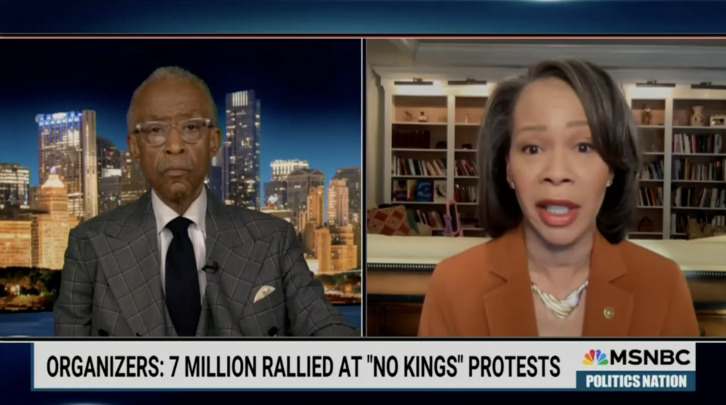October 20, 2025

Click here to watch the full interview.
Washington, D.C. – U.S. Senator Lisa Blunt Rochester (D-Del.) yesterday joined MSNBC’s PoliticsNation with Al Sharpton to discuss the nationwide No Kings demonstrations and the government shutdown.
Below are excerpts of the interview.
On the No Kings demonstrations
“I attended the first one in June in the northern part of my state, and yesterday, got the opportunity to attend the rally [in Rehoboth Beach]…The highway was stretched like for miles, with Delawareans saying, ‘We don’t accept kings in this country.’ And it was a powerful, powerful moment.”
“I think it was just a testament to the American spirit. You yourself, you know how powerful marches are and demonstrating peacefully. And so yesterday, I was filled up. I told people I’m taking that energy right back with me to Washington, D.C., because it was powerful. It was the power of the people.”
On the Government Shutdown
“The President of the United States…should be tweeting to Speaker Johnson to bring the members of the House back into session. You can’t negotiate with people if they’re not in the city, not in the Capitol, not at the table…Democrats, we’re clear…we want to open the government and we want to make sure that we restore people’s health care – the health care that was taken from them during that big, beautiful bill to pay for tax breaks for rich people. It’s clear, it’s simple, and we need them to be at the table or at least be in…Washington, D.C., to be able to work together to make sure we open the government and restore health care. This is about everybody.”
“…Businesspeople are being harmed, farmers are being harmed, people in my state, and disproportionately, people in red states are being harmed from this shutdown. So, Mr. President, instead of sending sombreros, do your job, come to the table, and bring Speaker Johnson with you.”
###
Senator Lisa Blunt Rochester represents Delaware in the United States Senate where she serves on the Committees on Banking, Housing, and Urban Affairs; Commerce, Science, and Transportation; Environment and Public Works; and Health, Education, Labor, and Pensions.
